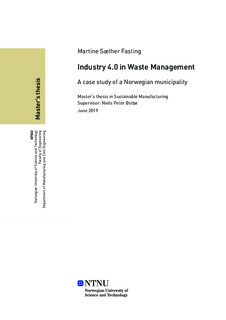| dc.description.abstract | The aim of this research has been to understand what potential the technologies embodied in Industry 4.0 hold for the management of municipal solid waste in Oslo.
Obtaining and exploiting the inherent resources of waste is becoming increasingly important. At the same time, the manufacturing industries are in what some call the fourth industrial revolution – new technologies such as IoT and artificial intelligence are disrupting the way products are made. Can the same technologies be used in the context of waste management?
Two research questions were formulated to address the problem statement:
1. What are the application areas of Industry 4.0 technologies for waste management?
2. How is the municipality of Oslo applying Industry 4.0 technologies for managing municipal waste?
To find answers, a literature review was conducted, as a well as a case study of the municipality of Oslo. Interviews and conversations were held with representatives of the Agency for Waste Management and the Waste-to-Energy Agency, and observations were made at the facility for waste treatment.
The literature review produced several findings relating to how Industry 4.0 technologies have been used within waste management. The areas identified are as follows:
• IoT solutions for real-time monitoring of waste generation
• The use of artificial intelligence for predicting waste generation
• The use of artificial intelligence and machine learning for waste classification
• Exploiting data stored in waste electronic and electric equipment (WEEE) for classification purposes
The case study found that the municipality of Oslo has implemented an IoT solution for monitoring waste, but that they have faced several obstacles that have made it hard for them to realize appreciable gains. The other application areas identified have not been put to use.
The municipality has started several digitalization initiatives, including a project on big data analytics. Furthermore, they are gradually improving their ICT infrastructure, which should enable them to proceed with even better solutions. Some identified challenges, e.g. poor data quality, should however be addressed when moving forward.
It is the author’s opinion that the municipality should consider adjusting its goals and organizational structure to have a better alignment with the principles of a circular economy. The waste hierarchy dictates that most discarded products should be reused or recycled, not incinerated for energy recovery. The agency responsible for treating waste, the Waste-to-Energy Agency, does not seem to be incentivized towards this goal. Further application areas for industry 4.0 technologies within waste management are sure to be discovered, and the municipality seems eager to exploit new technology – it is crucial then that these technologies are put to good use. | |
